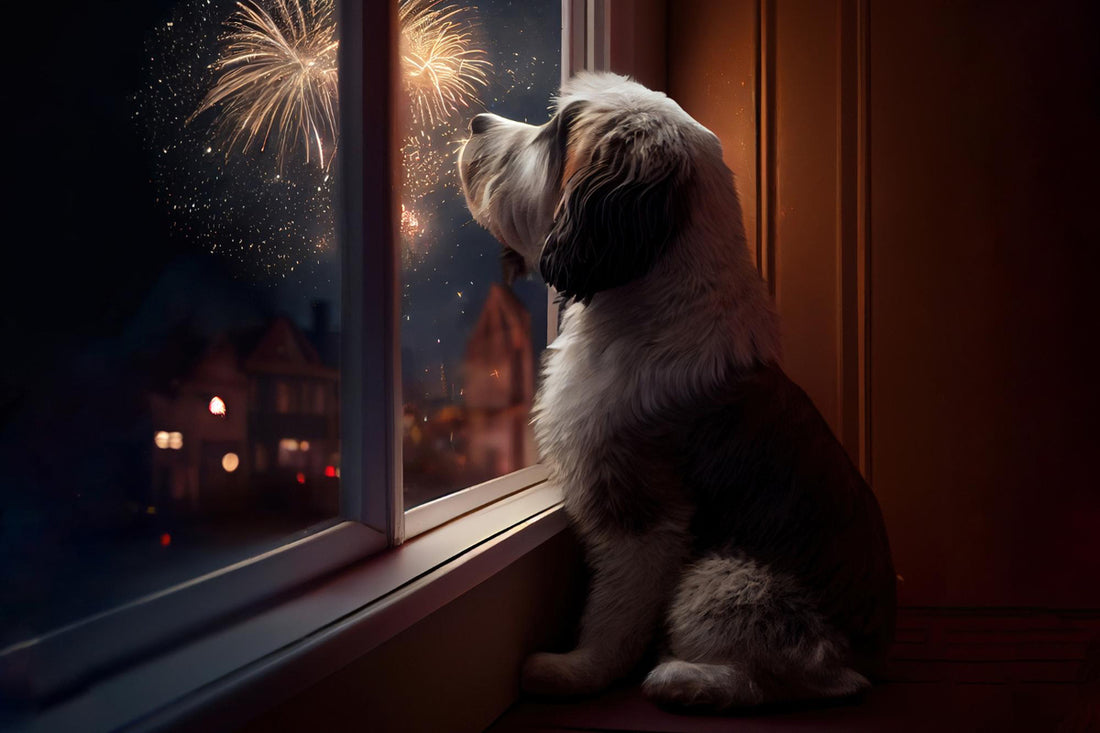How Easter fireworks cause stress in dogs and how we can help them deal with it in a calm way.
Orthodox Easter is celebrated on the first Sunday after the first full moon of Spring, after the vernal equinox. In 2024, the first full moon of Spring falls on Thursday, May 2, and therefore, Easter is celebrated on Sunday, May 5.
Easter fireworks are intertwined with the Resurrection. Although the spectacle is beautiful and the sky is filled with colors and lights, Easter fireworks cause intense anxiety in dogs. In fact, their fear can even lead to death as several dogs have escaped from their homes' yards, resulting in them not having access to food and water.
Below, we will analyze the reasons why Easter fireworks can affect our dog's psychology and present ways to help him cope with fireworks anxiety.
How Easter fireworks were established
Easter fireworks are a custom with roots lost in time. On Easter night, the custom is revived in most regions of Greece, where they are primarily used to exorcise evil and convey the resurrection message of Easter.
However, at this point, it is very important to emphasize that Easter fireworks can prove to be particularly dangerous, and many accidents have occurred that have even claimed human lives. This is why appropriate safety measures should be taken and the instructions for setting off fireworks, as described on the product packaging, should be carefully followed.
Why are some dogs afraid of Easter fireworks?
Flares, firecrackers, and fireworks can be unsettling for even the calmest dog. Pets' anxiety and fear of fireworks can be caused by a variety of factors. In short, sensory overload in dogs can cause them to panic. But how does this reaction occur?
The bright light and vibrant colors of fireworks can cause anxiety in some dogs, as they are likely to perceive them as threatening and dangerous.
If we compare a dog's hearing levels with a human's, we will understand that our pets have much more sensitive hearing, as a result of which they can hear high-pitched sounds that humans cannot hear. Another element that explains the panic in dogs is the fact that their hearing is constantly active, even during sleep.
Just as sensitive as our dog's hearing is his sense of smell. For dogs who orient themselves primarily by their sense of smell, the smells associated with fireworks also cause fear.
Finally, in some cases, a dog may not have been used to fireworks from a young age and consequently develop anxiety when encountering them for the first time.

Symptoms of dog anxiety over Easter fireworks
First, we must clarify that our dog's reaction to fireworks is not necessarily the same every year. What does this mean? That you should not discount your dog's reaction and of course, nor should you rest easy because he was calm in the past. Simply put, your dog may have always been relaxed about Easter fireworks, but this year he may be severely stressed for the first time. Let's look below at some of the mildest to most serious reactions your dog can have to fireworks.
Your four-legged friend may exhibit sudden tension and alertness, intense restlessness, flattened ears, trembling, panting, irregular gait, clinging to its owner, persistent barking, loss of saliva, urinary incontinence, repeated attempts to hide and attempts to escape from the house.
How to help your dog manage stress from Easter fireworks?

The advice that you should definitely follow is that if your dog is outside, i.e. in a garden or a yard, bring him inside the house to reduce the intensity of the noise and the glare, so that he feels more secure and eliminates the possibility of him escaping in an unknown direction. In any case, choose a collar for your dog that states his details to anticipate any unexpected movement of his, if it is not possible to bring him inside the house.
A smart trick is to turn up the TV to reduce the deafening sound of the fireworks or choose some music of your choice that will have the same intensity. In addition, a good idea is to place your dog in his bed, along with a blanket that will make him feel warm and with his favorite toys so that he feels safe. Finally, if in the past, the dog has displayed dangerous behavior or intense anxiety, it is recommended that you consider asking your veterinarian for special medications that will calm your four-legged friend.
In any case, a treat during fireworks has the power to distract the dog's attention, so that he does not focus on the noise and the flash. Alternatively, it can be a spoonful of peanut butter, which dogs love. Perhaps this is also a good opportunity to give him his favorite food. Prefer foods with meat or fish that you can easily enrich with natural sedatives in drops, such as valerian or chamomile.
At petchef , we source the best fresh ingredients for human consumption every day, and we never use preservatives or colorings. All ingredients are cooked at low temperatures using the Sous Vide method (vacuum cooking), so that all the necessary nutrients are preserved and at the same time any bacteria and pathogens are neutralized. They are then flash-frozen at low temperatures according to the HACCP food safety plan, so that the meals remain fresh until the day of delivery. Each of our recipes is designed in collaboration with our veterinary team and follows the FEDIAF (European Pet Food Industry Federation) standards for dog food at all stages of their life.
Find the right plan that suits your dog here !

